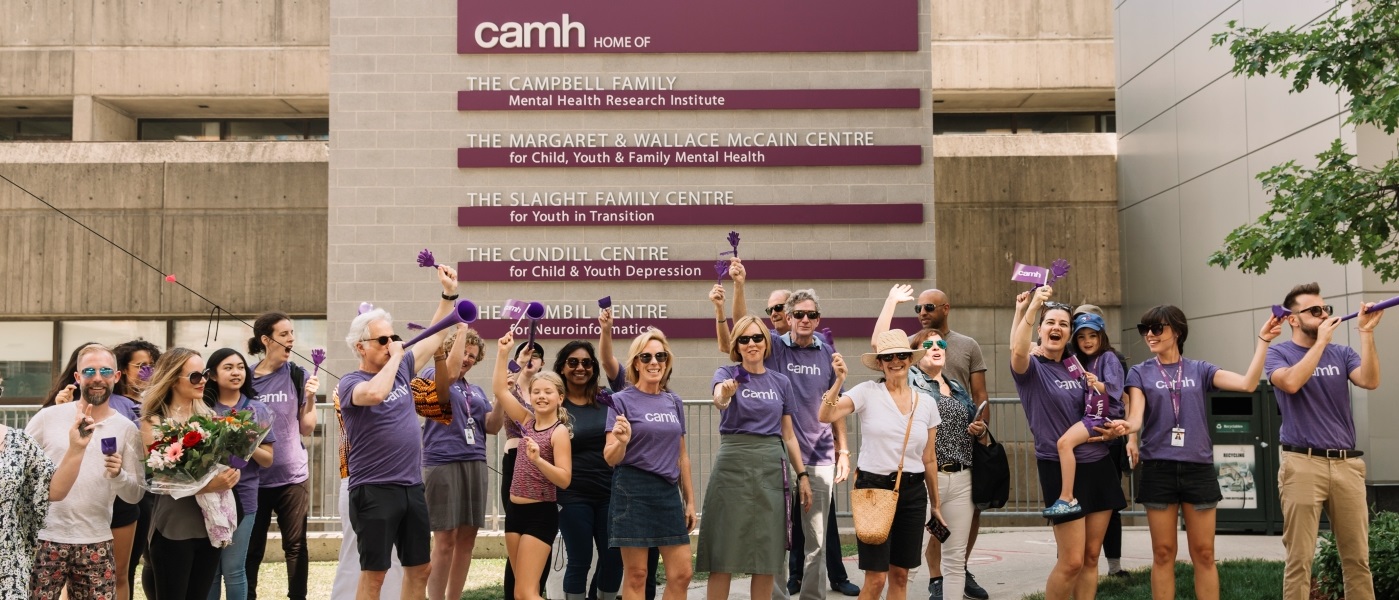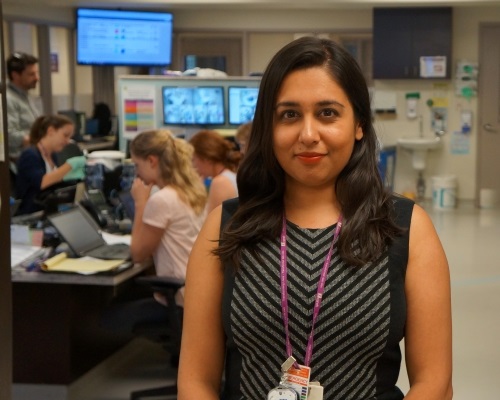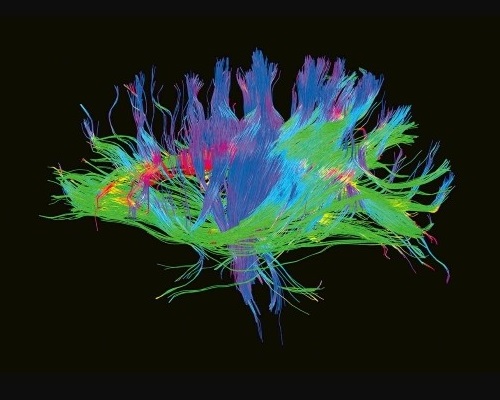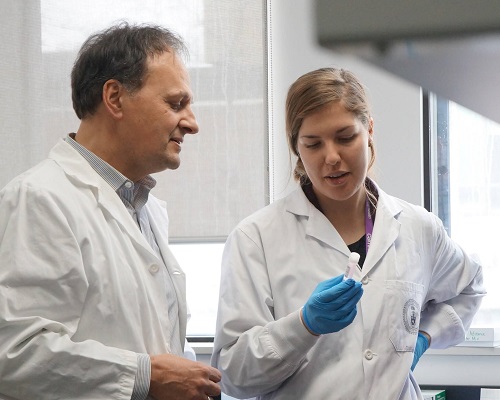

CAMH looks much different today than when I arrived two years ago. I’ve watched the physical transformation of our hospital happen in real-time—maybe you have, too. During this time, I’ve had a chance to reflect on what our bold redevelopment really means. It’s about so much more than bricks and mortar—it’s about the positive change we’re building together.
We are creating healing spaces in which people not only recover but also collaborate, connect and thrive; promoting respect and inclusivity so that everyone feels free to reach their full potential; opening our doors to our local community and the world; and most of all, giving people living with mental illness hope for a better tomorrow.
We’re quickly approaching the opening of our new buildings. I’m delighted to share just a few features of our revitalized campus that will transform mental health care and outcomes for the people we serve.

Earlier this year, we asked supporters like you to send in messages of hope that we literally built into the walls of the new Emergency Department.

Learning how to live and thrive in the community is a significant part of recovery. Located in the McCain Complex Care & Recovery Building, the Tour de Bleu Therapeutic Neighbourhood will be a shared space in which patients learn the skills they need for life beyond CAMH.

CAMH’s Gerald Sheff & Shanitha Kachan Emergency Department is the first point of contact for people in crisis. Since 2012, emergency department visits have increased by 87 percent—last year alone, 13,000 people came to us seeking urgent psychiatric care.

Empowering patients and family with important information and supports is key to recovery. The RBC Patient & Family Learning Space will be a vibrant education space in the McCain Complex Care & Recovery Building.

as part of Canada’s largest-ever campaign for mental health
of new clinical, research and education space
to care for people experiencing mental illness
My friend, one of my favourite parts of my job is having the opportunity to learn from CAMH’s world-leading researchers who are tackling some of the most complex mental health challenges. Here are some of the incredible CAMH people and programs that are inspiring hope for millions of people around the world living with mental illness.

Dr. Juveria Zaheer won the 2018 CAMH Engage Breakthrough Challenge for her work in suicide prevention.



Every year, 4,000 Canadians die by suicide—an average of 11 per day. CAMH researchers are committed to reducing suicide rates in Canada. Across the hospital, they are leading a number of suicide prevention research projects—from brain stimulation to genetics, touching on a range of ages and illnesses.
As a psychiatrist at CAMH's Gerald Sheff & Shanitha Kachan Emergency Department, Dr. Juveria Zaheer knows better than most what it is like to deal with people in the midst of a mental health crisis. Dr. Zaheer, Clinician Scientist in CAMH’s Institute for Mental Health Policy Research and 2019 CAMH Physician of the Year, led a study of hundreds of suicide notes in hopes of preventing further tragedies.
It is estimated that up to 90 per cent of people who die by suicide have an underlying mental illness. But it is also true that most people who experience suicidal thoughts do not die by suicide. Through this research, she aimed to understand the perspectives of those who have died by suicide and learn how to improve care for those at risk.
“The worst outcome for us as a profession is to lose a patient to suicide. What the notes taught me is that there is value in meeting the person where they’re at,” says Dr. Zaheer. "All we want to do as psychiatrists is to help people feel safe and reduce their suffering and distress.”
In June, CAMH celebrated the official opening of the Krembil Centre for Neuroinformatics. Led by Dr. Sean Hill, one of the world’s foremost computational neuroscientists, the Krembil Centre harnesses the power of big data, artificial intelligence and brain modelling to fundamentally change how we understand and treat mental illness.
Members of the multidisciplinary team have come from around the globe to find new ways of collecting, tracking, analyzing and applying data to deliver more personalized treatments and improve outcomes for people living with mental illness.
“This is a collaboration-based team focused on open science so that all people around the world—researchers and scientists to patients and their families—can benefit from our work,” says Dr. Hill.
The international team of scientists is already hard at work driving forward a number of innovative research initiatives. For example, the BrainHealth Databank is the first real-world application of the Krembil Centre’s work. It collects CAMH patient data—sleep patterns, genetics, brain structure and more—and will be a rich resource for advancing personalized mental health care.
New therapeutic molecules developed at CAMH show promise in reversing memory loss linked to depression and aging. Dr. Etienne Sibille, Deputy Director of the Campbell Family Mental Health Research Institute, and his team specifically designed the new molecules to bind to and activate a receptor in the brain associated with mood and memory symptoms in depression and aging.
In a preclinical study on memory loss, a single dose of the molecules returned memory performance to normal levels within 30 minutes. In another experiment related to aging, memory declines were rapidly reversed and memory performance reached levels seen in youth or earlier stages of adulthood. Dr. Sibille expects to start testing the molecules in clinical research in two years.
“We’ve shown that our molecules enter the brain, are safe, activate the target cells and reverse the cognitive deficit of memory loss,” he says.
CAMH’s work in this area fills a significant gap in mental health research and treatment. It gives hope for more complete recovery to people who are experiencing cognitive deficits and sets the stage for the possibility of preventing memory loss and delaying the onset of Alzheimer’s disease.
Every year, 4,000 Canadians die by suicide—an average of 11 per day. CAMH researchers are committed to reducing suicide rates in Canada. Across the hospital, they are leading a number of suicide prevention research projects—from brain stimulation to genetics, touching on a range of ages and illnesses.
As a psychiatrist at CAMH’s Emergency Department, Dr. Juveria Zaheer knows better than most what it is like to deal with people in the midst of a mental health crisis. Dr. Zaheer, Clinician Scientist in CAMH’s Institute for Mental Health Policy Research and 2019 CAMH Physician of the Year, led a study of hundreds of suicide notes in hopes of preventing further tragedies.
It is estimated that up to 90 per cent of people who die by suicide have an underlying mental illness. But it is also true that most people who experience suicidal thoughts do not die by suicide. Through this research, she aimed to understand the perspectives of those who have died by suicide and learn how to improve care for those at risk.
“The worst outcome for us as a profession is to lose a patient to suicide. What the notes taught me is that there is value in meeting the person where they’re at,” says Dr. Zaheer. "All we want to do as psychiatrists is to help people feel safe and reduce their suffering and distress.”
In June, CAMH celebrated the official opening of the Krembil Centre for Neuroinformatics. Led by Dr. Sean Hill, one of the world’s foremost computational neuroscientists, the Krembil Centre harnesses the power of big data, artificial intelligence and brain modelling to fundamentally change how we understand and treat mental illness.
Members of the multidisciplinary team have come from around the globe to find new ways of collecting, tracking, analyzing and applying data to deliver more personalized treatments and improve outcomes for people living with mental illness.
“This is a collaboration-based team focused on open science so that all people around the world—researchers and scientists to patients and their families—can benefit from our work,” says Dr. Hill.
The international team of scientists is already hard at work driving forward a number of innovative research initiatives. For example, the BrainHealth Databank is the first real-world application of the Krembil Centre’s work. It collects CAMH patient data—sleep patterns, genetics, brain structure and more—and will be a rich resource for advancing personalized mental health care.
New therapeutic molecules developed at CAMH show promise in reversing memory loss linked to depression and aging. Dr. Etienne Sibille, Deputy Director of the Campbell Family Mental Health Research Institute, and his team specifically designed the new molecules to bind to and activate a receptor in the brain associated with mood and memory symptoms in depression and aging.
In a preclinical study on memory loss, a single dose of the molecules returned memory performance to normal levels within thirty minutes. In another experiment related to aging, memory declines were rapidly reversed and memory performance reached levels seen in youth or earlier stages of adulthood. Dr. Sibille expects to start testing the molecules in clinical research in two years.
“We’ve shown that our molecules enter the brain, are safe, activate the target cells and reverse the cognitive deficit of memory loss,” he says.
CAMH’s work in this area fills a significant gap in mental health research and treatment. It gives hope for more complete recovery to people who are experiencing cognitive deficits and sets the stage for the possibility of preventing memory loss and delaying the onset of Alzheimer’s disease.

You might remember Salima — she shared her story as a patient at CAMH and helped us wish you a Happy New Year. I’m so lucky to work here and meet people like Salima who inspire us with their journeys of recovery and their dedication to giving back to the community.

I came to CAMH with serious mental illness and a damaging addiction to alcohol—but I left with a new understanding of myself, a loving relationship with my two daughters and hope for a better tomorrow.
I had tried to get past my addiction before but it always returned. I’d been using alcohol to cope with past trauma. I wasn’t a present mother.
Things changed in 2012. CAMH helped me really work on my recovery. I learned why my addiction kept coming back, and why my mental health hadn’t been getting better. In group therapy, I learned I wasn’t the only person going through this. I worked with people who were caring and so non-judgmental, and they taught me so much.
When I came to CAMH, my goal had been to stop drinking—but I’ve achieved so much more. I now have such wonderful relationships with my daughters. They’ve been with me through every part of my CAMH journey. I volunteer at Suits Me Fine, CAMH’s clothing boutique for patients, and I’m continuing my education through CAMH’s Recovery College—with support from CAMH’s Client Learning Fund—because I want to help people just like me on their own road to recovery. I want to give back.
I’m so grateful for CAMH and for the opportunities it’s given me. I have so much more than I ever thought I could, and I have so much hope.
I’d like to introduce you to a few members of the CAMH family who are driving change for mental health—just like you.

Over 13,000 patients benefit each year from the resources offered by Gifts of Light.
CAMH is full of incredible programs that provide hope and a path toward recovery for our patients. One program that holds a special place in my heart is Gifts of Light. You might be familiar with it—it’s a 100 per cent donor-funded program that provides patients with practical gifts (things like toiletries and pajamas) and meaningful experiences (everything from art classes to pet therapy) to remind them that they are not alone in their journey.
I often hear from CAMH patients how much this program means to them and the positive impact it’s had on their lives. I’m also inspired by the messages of support and encouragement from those who choose to give to Gifts of Light. Take a look at some of the heartfelt words people like you have shared with our patients:






I’m so glad to have had the opportunity to share with you some of the amazing things happening at CAMH—and how you’re making a difference for the people we serve. We’re driving change together by opening the door to new conversations about mental health. Thank you for your continued support and for believing Mental Health is Health!
Let's keep the conversation going. Did this update make you feel proud about your support of CAMH?